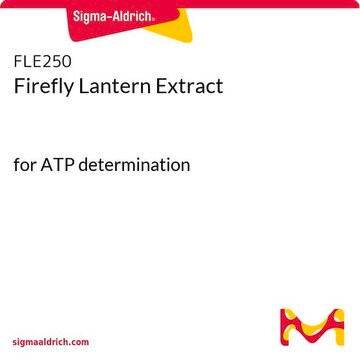SCT154
Firefly Luciferase Assay
Flash-type luciferase assay designed for simple and efficient quantitation of firefly luciferase reporter enzyme activity from cultured cells with high sensitivity and linearity.
Synonym(s):
Firefly Luciferase Assay, Bioluminescent Assay
Sign Into View Organizational & Contract Pricing
All Photos(1)
About This Item
UNSPSC Code:
12352207
NACRES:
NA.84
Recommended Products
technique(s)
cell based assay: suitable
detection method
chemiluminescent
shipped in
ambient
Related Categories
General description
Firefly luciferase is widely used as a reporter for studying gene regulation and function, and for pharmaceutical screening. It is a very sensitive genetic reporter due to the absence of endogenous luciferase activity in mammalian cells or tissues. Firefly luciferase is a 62,000 Dalton protein, which is active as a monomer and does not require subsequent processing for its activity. The enzyme catalyzes ATP-dependent D-luciferin oxidation to oxyluciferin, producing light emission centered at 560 nm. Light emitted from the reaction is directly proportional to the number of luciferase enzyme molecules.
The Firefly Luciferase Assay is designed for simple and efficient quantitation of firefly luciferase reporter enzyme activity from cultured cells with high sensitivity and linearity. This is a flash-type luminescence assay that requires signal to be measured immediately after adding working solution to samples. The luminescence signal decays over the course of about 10 minutes of reaction time, although signal half-life may vary depending on luciferase expression levels.
The Firefly Luciferase Assay is designed for simple and efficient quantitation of firefly luciferase reporter enzyme activity from cultured cells with high sensitivity and linearity. This is a flash-type luminescence assay that requires signal to be measured immediately after adding working solution to samples. The luminescence signal decays over the course of about 10 minutes of reaction time, although signal half-life may vary depending on luciferase expression levels.
Application
Firefly Luciferase Assay
Flash-type luciferase assay designed for simple and efficient quantitation of firefly luciferase reporter enzyme activity from cultured cells with high sensitivity and linearity.
Research Category
Cell Signaling
Cell Signaling
Research Sub Category
Live Cell Dye
Live Cell Dye
Components
1) 5X Firefly Luciferase Lysis Buffer (CS224525): 2 X 15 mL
2) Firefly Luciferase Assay Buffer 2.0 (CS224585): 100 mL
3) D-Luciferin (CS224519): 2 X 10 mg
2) Firefly Luciferase Assay Buffer 2.0 (CS224585): 100 mL
3) D-Luciferin (CS224519): 2 X 10 mg
Physical form
liquid
Storage and Stability
Store Firefly Luciferase Assay at -80°C. Firefly Luciferase Assay Buffer 2.0 is stable at -20°C for three months and at –80°C for at least six months from date of receipt. The other kit components are stable at -20°C for at least six months from date of receipt. Kit components and D-luciferin stock solutions in water are stable to at least 5 freeze-thaw cycles.
Disclaimer
Unless otherwise stated in our catalog or other company documentation accompanying the product(s), our products are intended for research use only and are not to be used for any other purpose, which includes but is not limited to, unauthorized commercial uses, in vitro diagnostic uses, ex vivo or in vivo therapeutic uses or any type of consumption or application to humans or animals.
Storage Class Code
10 - Combustible liquids
Certificates of Analysis (COA)
Search for Certificates of Analysis (COA) by entering the products Lot/Batch Number. Lot and Batch Numbers can be found on a product’s label following the words ‘Lot’ or ‘Batch’.
Already Own This Product?
Find documentation for the products that you have recently purchased in the Document Library.
Customers Also Viewed
Articles
Firefly luciferase is a sensitive reporter for gene studies due to its absence in mammalian cells or tissues.
Our team of scientists has experience in all areas of research including Life Science, Material Science, Chemical Synthesis, Chromatography, Analytical and many others.
Contact Technical Service










